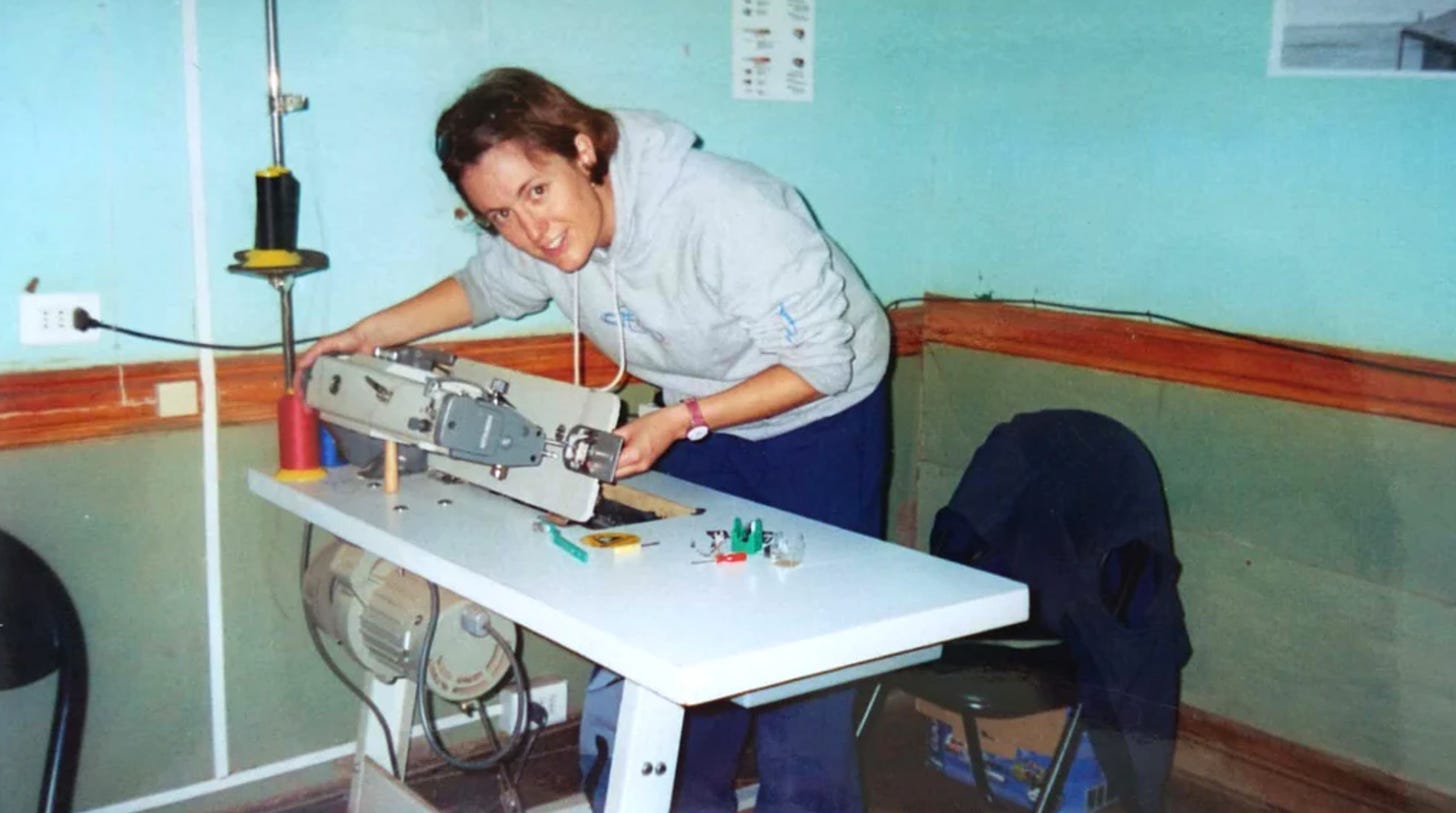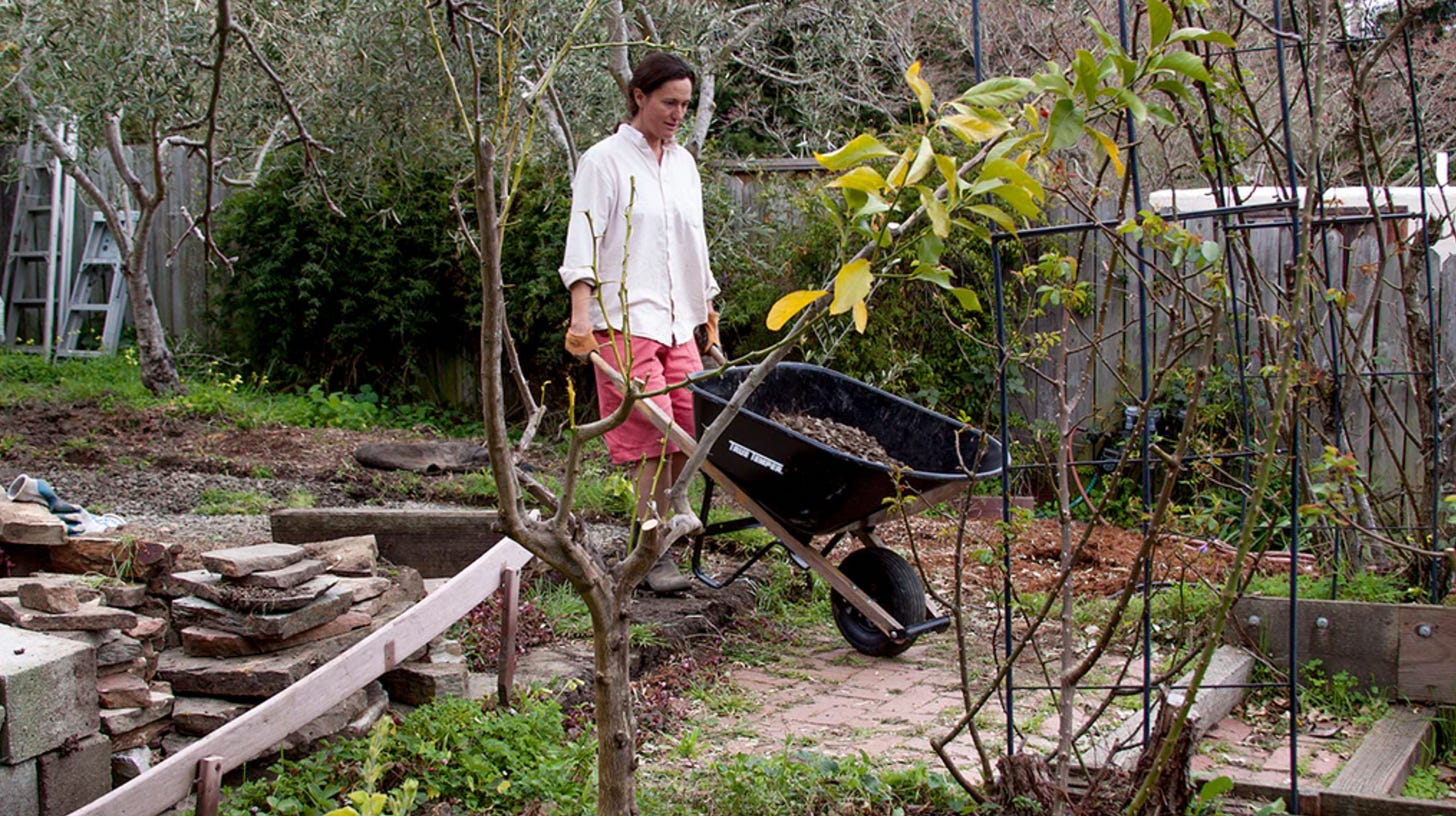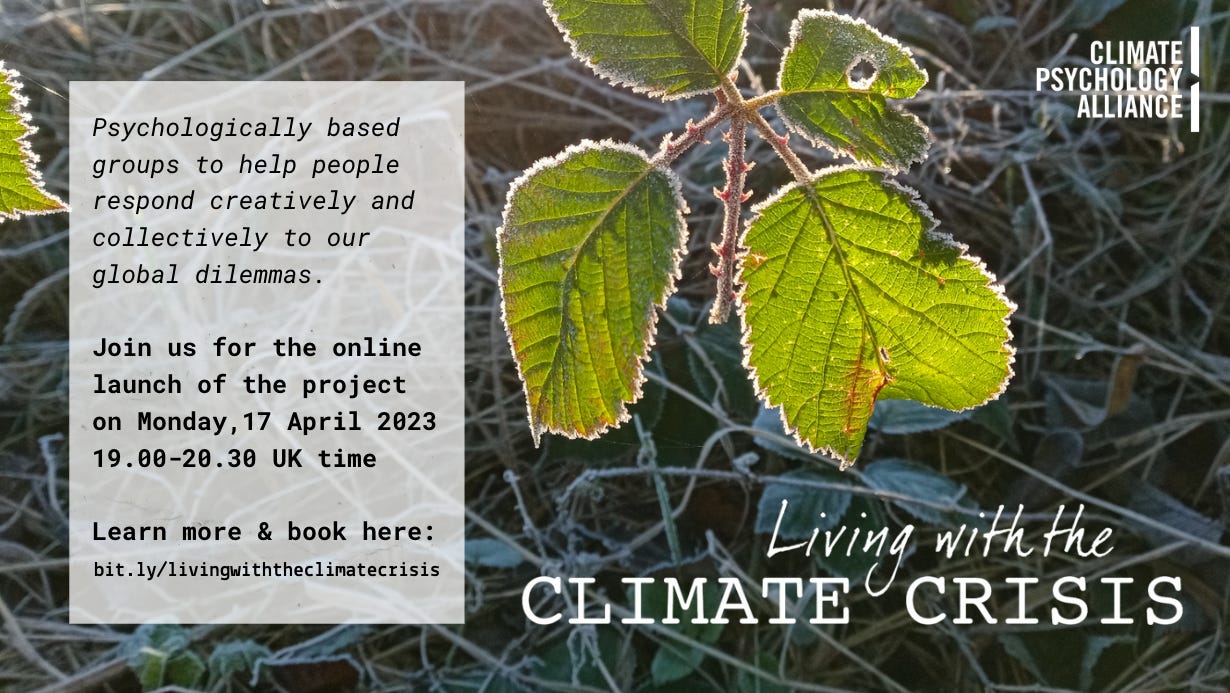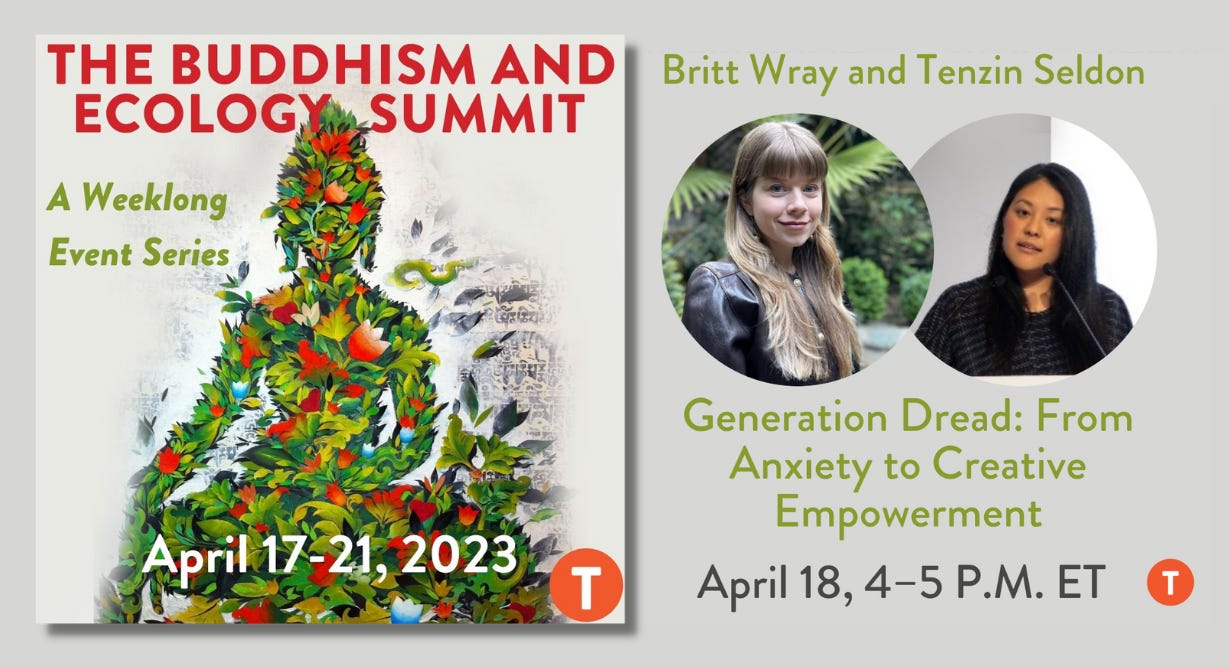Gardening: a healing practice in the climate crisis
A lifelong gardener shares how growing keeps her grounded
Hi there!
Welcome to Gen Dread, a newsletter about how the climate crisis is making us feel, why that’s happening, and what we can do about it. Subscribe now to find community, comfort, and practical coping strategies from experts all around the world.
Meet Anne Fletcher.
Anne is the founder of Orta Gardens, a Berkeley, California-based company that designs self-watering seed pots and zero-waste kits. She also runs a newsletter about gardening as a form of personal and collective healing. You can subscribe to that here. She talked to Gen Dread about how gardening has become a place to fully inhabit her feelings about climate change, and why it’s starting to infuse those feelings with hope.
How did you find gardening initially, or how did it find you?
AF: Gardening found me as a kid but didn’t really grab me until many years later. My parents had a raspberry patch in the backyard, and visiting my grandparents in the summer, I was often sent to the garden to collect salad for dinner. To this day, the smell of fresh-cut dill takes me straight back to summer twilight on the BC coast.
I re-found gardening as a grown-up living in Silicon Valley, working as a design engineer for a solar start-up and then later as a freelance design consultant. The stress I felt in those jobs was held deeply in my body. One gig, studying fast-food in malls across the country, left me so distressed that after each research trip I took five-hour solo hikes crying through the woods to shed the feelings.
Learning to cook in those days was a healing practice, I can see now in retrospect. And the more you cook, the more you get interested in ingredients. Thai basil is what got me into gardening. I *really* wanted it, but couldn’t buy it anywhere. So I got some seeds and started trying to grow my own. And then I promptly killed all my seedlings. I was a terrible gardener, but I was hooked. I had nowhere to go but up!
Can you describe your emotional state in the face of the climate crisis?
I’ve been through a lot of phases in my emotional response to the climate crisis!
My first emotion was hope and can-do attitude. I was 14 in 1990 when an older cousin gave me an Earth Day t-shirt, and I had a sense of being part of something bigger than myself. I had heard of the “greenhouse effect” even back then, and I understood that wearing my green, tie-dye earth day shirt was an important statement. I think I wore that shirt for 10 years.
The next emotion was intense fear. In astronomy class in college our professor explained that Venus is very similar to Earth, except that it had a “runaway greenhouse effect.” She explained that as temperatures go up, water evaporates, entering the atmosphere, trapping more heat, evaporating more water until all the water is vapor and the planet’s surface is 700 degrees like Venus. Wait, what??? That scared the bejeezus out of me. Still does. Even though everything I’ve read suggests that’s unlikely for Earth. We’re just facing mass extinction and civilization collapse. No biggie.
Guilt and personal responsibility hit me circa 2003 when I was running a surf company on the coast of Chile. We manufactured surfboard covers and backpacks, sewing them from fabrics that are essentially plastics: PVC or urethane coated nylon is pretty typical backpack fabric. One day, taking out the trash, I had an epiphany: If my tiny little company here in this dusty little town on the southern tip of the world could be making this much plastic trash…oh my God. The scale of garbage and destruction hit me viscerally, like for one moment I could actually grasp all the world’s waste in my tiny human brain.
The guilt and responsibility were crushing. And anger that so many other companies could be doing the same thing, on a much bigger scale, and they didn’t seem to be bothered.
I returned to the US to study product design, to figure out how to make things with cleaner materials and processes. But what I learned right away was that simply substituting better materials without changing the underlying systems and infrastructure doesn’t make much difference.
Eventually that led me to where I am today, teaching design part time at UC Berkeley while making pots for gardeners to start their seeds, an extremely conscious choice to do as little harm directly with my professional actions, and hopefully help my students and customers nurture their own deeper connections with nature.
Today the main emotions I feel are anger and sadness, with a little hope creeping back in.
I’m angry that so few people around me seem to care. Whenever a neighbor fires up a gas-powered leaf blower I totally lose it. Here I am riding a bike everywhere, agonizing over how to get rid of the plastic in the *backing* of the shipping labels I use, and they can’t even be bothered to use a broom? Honestly, I get using your car – I use mine more than I would like – our infrastructure doesn’t give us many good choices. But burning fossil fuel to blow dirt and leaves around?? Come on. I see red.
(I also know, once I’ve calmed down, that these neighbors are overwhelmed in their own way, and “clean the yard” is just one more chore on a long list. They hire a crew and then put it out of their mind. And the truth is, I envy them to some extent. My day-to-day life would be easier without all the knowing and feeling about climate and the non-human world.)
Though the destruction continues to accelerate, some days I feel real hope. For the first time in my lifetime, there is a real mainstream climate movement. And the more I understand earth systems firsthand in my garden, the more I learn how resilient they are. The moment soil is healthy, plants grow. The moment you have flowering plants, pollinators arrive. I do have real hope that if (and that’s a big “if”) we can stop destroying, healing will happen.
How does gardening help you manage those feelings? Why do you think it's such a healing practice?
The mechanism is mysterious to me, but it works! I go outside to gather some leaves for dinner, or do some weeding, and my mood just shifts. I wrote a newsletter about it a few months ago and got tons of responses from other gardeners who agreed. One said that her pain seems to lessen when she’s in the garden. Another talked about going outside tired, but coming back in energized. It’s all the good things you’re supposed to do, right? Being outside in the fresh air, being mindful and in the moment, getting some gentle movement, seeing the beauty of plants (even when the garden overall is a mess!), having transcendent mini-moments when you notice the first lady bug of the season, or a pea shoot poking up through the earth.
I think for those of us with big climate emotions, it’s important to connect with the parts of nature that are still working really well. There is life in the soil! Resilient, robust life! If you learn to care for that soil, it will thrive, and your plants will thrive. (And also the gophers will thrive, but that’s a story for another day!) All is NOT lost. The garden is alive. And there is power and agency in being harmonious with that life. Tending a garden is a direct, literal way to care for the earth. And that is very, very healing.
What does gardening give you? (spiritually, mentally, emotionally, or otherwise)
Gardening gives me connection to the earth and to the non-human world. When I see people who are mostly wrapped up in human-ish things (clothes, status, meetings, traffic, etc) I feel sad for all they’re missing.
Gardening gives me food, lots of it!
Gardening gives our family a beautiful outdoor space where we spend tons of time. And a wholesome activity that we all enjoy.
Gardening gives me connection to other gardeners, who are the nicest people.
You've noted that your newsletter demographic is split fairly evenly between lefty hippies and conservative Christians. How do you approach the topic of climate in your discussions when dealing with such a polarized readership?
Both sides of the “divide” are indistinguishable. All are interested in growing healthy, clean food, creating beauty in our gardens, supporting pollinators and beneficial wildlife, raising our children with skills and appreciation for gardening. We’re frugal. We don’t waste food. We don’t mind getting dirty.
When I talk about climate in my newsletter, I don’t talk about it within the frame of bipartisan politics or the culture wars. I talk about how as weather becomes more extreme and unpredictable, we gardeners have to adapt. I talk about planting schedules, changing flowering times, or chill hours for fruit trees. I talk about preserving genetic diversity in food crops to hedge against extreme weather. Weather is seriously important for growing food, and it’s good common sense to pay attention to it. And if there is anything you can do to help keep the weather from getting even more extreme, that’s probably a good idea.
Do you see gardening as a form of climate activism? How so?
Absolutely. On a personal level, it’s a big part of what supports me to keep going every day. To keep running this small business, keeping as light a footprint as possible, while competing against giants like Amazon who couldn't care less . . . it’s a LOT. I can’t imagine staying mentally healthy without a serious, regular dose of outside nature time. And for most of us, it’s easier to get into the backyard (or your houseplant garden) than to get to a truly wild outdoor area.
Collectively, gardening is contagious. Gardeners are out there swapping seeds, forming clubs, teaching neighbors, and encouraging more gardeners in a gentle, friendly human way. And the more of us that are gardening, the more we’re awakening our innate connection with the natural world. A personal, tangible, emotional connection to the climate, that completely removes it from partisan politics and makes you feel like actually, yes, when it comes to the weather, we’re all literally in this together, like it or not.
Making Waves
Living with the climate crisis is a series of group meetings which help people respond to the climate crisis, both personally and collectively. The groups provide a space for people to talk, to share, to express what they feel and to reflect. They offer tools, ideas and skills. They emphasise our shared humanity, our interdependence and the need for a collective response. They are rooted in psychological understandings of our distress, of our difficulties in communication and of each person’s need to find a place in a bewildering array of possibilities for action. It is offered by the Climate Psychology Alliance and can be found at a new dedicated website where you can view, read and download the new materials that support the group meetings for free.
Join the online launch of Living with the climate crisis on Monday 17 April 19.00-20.30 UK time. At the launch, authors Rosemary Randall, Rebecca Nestor, Daniela Fernandez-Catherall and Andy Brown will introduce the new materials, talk about the thinking behind the project, and answer your questions.
Join our friends at Tricycle: The Buddhist Review April 17-21 for the second annual Buddhism and Ecology Summit, a weeklong series of conversations with Buddhist teachers, writers, activists and psychologists on transforming eco-anxiety into awakened action. Featuring Roshi Joan Halfix, Rebecca Solnit, Bill McKibben, Dekila Chungyalpa, Lama Liz Monson, Britt Wray, Tenzin Seldon and many others, we’ll explore perspectives and practices for working with difficult emotions and creating pathways towards meaningful change. This is a donation-based event series with a suggested donation of $40.
Composer Kian Ravaei has released California Suite, an instrumental composition for flute and piano that borrows melodies from endangered California birdsongs. Through his music, Ravaei adds his voice to those demanding the protection of California’s natural ecosystems. “I wanted to memorialize these endangered California birds in order to raise awareness for the effects that climate change is having on their species,” said Ravaei. California Suite is available as an album on Bandcamp, where 100% of proceeds are donated to Audubon California, a non-profit organization dedicated to bird and wildlife conservation.
As always, you can share your thoughts and reach the Gen Dread community by commenting on this article or replying to this email. You can also follow along on Twitter and Instagram.
‘Till next time!










This was a very moving article and I could really see myself in many of the thoughts that Anne expressed. If I would have one comment is that while very pretty, the constantly looping graphic animation was very distracting when trying to read the text. I found myself having to scroll past it to be able to focus on the text. Maybe have it animation more slowly and just once would alleviate those feelings. You get the beautiful animation without distracting from the text. (I'm a graphic designer so I just think about these things a lot. Keep up the amazing newsletter!)
Relate HARD to the judging the neighbors while you grind at being a responsible, thoughtful environmentalist AND the simultaneous jealousy of their lightness of being. I've been to so many birthdays, showers, gatherings where I'm sweating over the plastic cutlery and plates, piles of meat, etc. while others are just enjoying themselves and I think *sigh* I can't even rememeber what that feels like. Thank you for this beautiful piece. I'm a beginner gardener and already feeling the amazing benefits. It's something so instinctual and earthy.